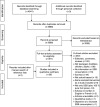Efficacy of school-based interventions aimed at decreasing sugar-sweetened beverage consumption among adolescents: a systematic review
- PMID: 28173882
- PMCID: PMC10261378
- DOI: 10.1017/S1368980017000076
Efficacy of school-based interventions aimed at decreasing sugar-sweetened beverage consumption among adolescents: a systematic review
Abstract
Objective: To verify the efficacy of school-based interventions aimed at reducing sugar-sweetened beverage (SSB) consumption among adolescents in order to develop or improve public health interventions.
Design: Systematic review of interventions targeting adolescents and/or the school environment.
Setting: The following databases were investigated: MEDLINE/PubMed, PsycINFO, CINAHL and EMBASE. Proquest Dissertations and Theses was also investigated for unpublished trials.
Subjects: Adolescents were defined as individuals between the ages of 12 and 17 years.
Results: A total of thirty-six studies detailing thirty-six different interventions tested among independent samples (n 152 001) were included in the review. Twenty interventions were classified as educational/behavioural and ten were classified as legislative/environmental interventions. Only six interventions targeted both individuals and their environment. Over 70 % of all interventions, regardless of whether they targeted individuals, their environment or both, were effective in decreasing SSB consumption. Legislative/environmental studies had the highest success rate (90·0 %). Educational/behavioural interventions only and interventions that combined educational/behavioural and legislative/environmental approaches were almost equally effective in reducing SSB consumption with success rates of 65·0 and 66·7 %, respectively. Among the interventions that had an educational/behavioural component, 61·5 % were theory-based. The behaviour change techniques most frequently used in interventions were providing information about the health consequences of performing the behaviour (72·2 %), restructuring the physical environment (47·2 %), behavioural goal setting (36·1 %), self-monitoring of behaviour (33·3 %), threat to health (30·6 %) and providing general social support (30·6 %).
Conclusions: School-based interventions show promising results to reduce SSB consumption among adolescents. A number of recommendations are made to improve future studies.
Keywords: Adolescents; School-based interventions; Sugar-sweetened beverages; Systematic review.
Figures
Similar articles
-
Effectiveness of school-based approaches for reduction of sugar and sugar-sweetened beverages in children: a systematic review and meta-analysis.Evid Based Dent. 2025 Jun;26(2):113. doi: 10.1038/s41432-024-01103-6. Epub 2025 Feb 5. Evid Based Dent. 2025. PMID: 39910218
-
Strategies for enhancing the implementation of school-based policies or practices targeting risk factors for chronic disease.Cochrane Database Syst Rev. 2017 Nov 29;11(11):CD011677. doi: 10.1002/14651858.CD011677.pub2. Cochrane Database Syst Rev. 2017. Update in: Cochrane Database Syst Rev. 2022 Aug 29;8:CD011677. doi: 10.1002/14651858.CD011677.pub3. PMID: 29185627 Free PMC article. Updated.
-
Physical activity, diet and other behavioural interventions for improving cognition and school achievement in children and adolescents with obesity or overweight.Cochrane Database Syst Rev. 2018 Mar 2;3(3):CD009728. doi: 10.1002/14651858.CD009728.pub4. Cochrane Database Syst Rev. 2018. PMID: 29499084 Free PMC article.
-
Physical activity, diet and other behavioural interventions for improving cognition and school achievement in children and adolescents with obesity or overweight.Cochrane Database Syst Rev. 2018 Jan 29;1(1):CD009728. doi: 10.1002/14651858.CD009728.pub3. Cochrane Database Syst Rev. 2018. Update in: Cochrane Database Syst Rev. 2018 Mar 02;3:CD009728. doi: 10.1002/14651858.CD009728.pub4. PMID: 29376563 Free PMC article. Updated.
-
Incentives for preventing smoking in children and adolescents.Cochrane Database Syst Rev. 2017 Jun 6;6(6):CD008645. doi: 10.1002/14651858.CD008645.pub3. Cochrane Database Syst Rev. 2017. PMID: 28585288 Free PMC article.
Cited by
-
Effectiveness of behavioral interventions and behavior change techniques for reducing soft drink intake in disadvantaged adolescents: A systematic review and meta-analysis.Obes Sci Pract. 2020 Oct 8;6(6):708-734. doi: 10.1002/osp4.452. eCollection 2020 Dec. Obes Sci Pract. 2020. PMID: 33354348 Free PMC article. Review.
-
Using implementation strategies to promote the maintenance of Kids SIPsmartER in rural Appalachian middle schools: a process evaluation.BMC Public Health. 2025 Jul 3;25(1):2324. doi: 10.1186/s12889-025-23554-x. BMC Public Health. 2025. PMID: 40611074 Free PMC article.
-
Prevalence and Predictors of Soft Drink Consumption among Adolescents in the Gulf Countries: Findings from National Surveys.Nutrients. 2024 Aug 10;16(16):2637. doi: 10.3390/nu16162637. Nutrients. 2024. PMID: 39203774 Free PMC article.
-
Sugar-sweetened beverages consumption among New Zealand children aged 8-12 years: a cross sectional study of sources and associates/correlates of consumption.BMC Public Health. 2021 Dec 13;21(1):2277. doi: 10.1186/s12889-021-12345-9. BMC Public Health. 2021. PMID: 34903202 Free PMC article.
-
School-based healthy eating interventions for adolescents aged 10-19 years: an umbrella review.Int J Behav Nutr Phys Act. 2024 Oct 14;21(1):117. doi: 10.1186/s12966-024-01668-6. Int J Behav Nutr Phys Act. 2024. PMID: 39402562 Free PMC article.
References
-
- World Health Organization (2003) Diet, Nutrition and the Prevention of Chronic Diseases. Joint WHO/FAO Expert Consultation. WHO Technical Report Series no. 916. Geneva: WHO. - PubMed
-
- Ahluwalia N, Dalmasso P, Rasmussen M et al.. (2015) Trends in overweight prevalence among 11-, 13- and 15-year-olds in 25 countries in Europe, Canada and USA from 2002 to 2010. Eur J Public Health 25, Suppl. 2, 28–32. - PubMed
-
- Roberts KC, Shields M, de Groh M et al.. (2012) Overweight and obesity in children and adolescents: results from the 2009 to 2011 Canadian Health Measures Survey. Health Rep 23, 3–7. - PubMed
-
- World Health Organization (2000) Obesity: Preventing and Managing the Global Epidemic. Report of a WHO Consultation. WHO Technical Report Series no. 894. Geneva: WHO. - PubMed
Publication types
MeSH terms
Substances
LinkOut - more resources
Full Text Sources
Other Literature Sources
Medical


